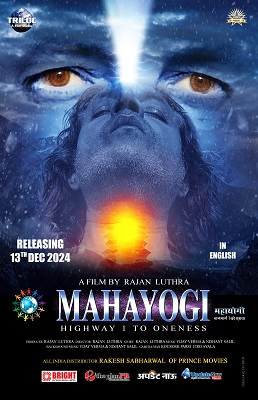Books
Mahayogi-Highway 1 to Happiness, Review: An impassioned monologue for universal peace and tolerance


Mahayogi-Highway 1 to Happiness, Review: An impassioned monologue for universal peace and tolerance
There are films and there are films. Some are routine, masala, formulaic films, and there are path-breaking, experimental films, off the beaten track. There are also films that can barely be called films. These are genre-defying (which is the experimental part) and grammar-denying (which is the indulgent part). Mahayogi-Highway 1 to Heaven (English) is one such film. 90% of the film is a one-man-show, with that man’s own voice over, whether on screen without any living things or when he is speaking for himself, as a commentary.
Non Resident Indian (NRI) Rajan Luthra has made one such film, which has the thinnest thread of linear narrative and the one of the longest discourses on burning issues, like war, religious intolerance and oneness of the world. Seems a noble film on paper. But when you watch it, you cannot shy away from the bare fact that this is not cinema as we know it. There is a semblance of a beginning, middle and end, in the right order, but nothing really happens in the film.
We hear tomes upon tomes of lectures and prayers about all that is wrong this world, wrongs perpetrated by politicians and religious players, and we hear messages that tell us to look inwards in our quest for seeking contact with our maker, and with world peace and tolerance. This is what every holy-man does as a daily routine, but our protagonist is not-our regular God-man. He is a businessman-turned philanthropist, who shares his spiritual search with the audience. But it is constructed in the commentary-added-to-chosen-visuals style, or vice versa, with the monologue/discourse much more prominent than the sparse dialogue and story. Certainly not everyman’s cup-of-tea.
I cannot help remembering an incident when Raju Nair, an acquaintance, referred me to producer-director Mahesh Bhatt, to get me an acting assignment, four decades ago, and asked me to meet him at a sound recording studio-cum-laboratory in Tardeo, Central Mumbai. I arrived at the appointed time, and was told to remove my shoes and then enter the hall. On entering, at the appointed time, I saw Mahesh Bhatt, Raju Nair and about 10 other men, seated on the floor, leaning their backs of the wall, and a pin-drop silence. I thought some tragedy had struck. But a sound dispelled all such doubts. It was emanating from a two-in-one cassette player, and obviously sounded like the voice of Acharya (also later called Bhagwan and Osho) Rajneesh, the worldly-wise sadhu who had his base in Pune. Noticing that I had entered the room, Raju Nair gestured to me to sit down like all others, and listen to that audio-tape. Not listening was not an option, because I was the seeker and Mahesh Bhatt the giver.
It went on for about 45 minutes, one whole side of a cassette. Cassettes, the most common form of recordings, those days were manufactured in two standard lengths, 30 minutes a side and 90 minutes a side. This was the latter variety, and, apparently, begun a minute or so before I entered. Nobody was saying anything. All were glued, in a trance-like posture. I sat down too, perplexed, but not before I had spotted Raju and said to him, “Raju, I…,” when I was politely silenced with a shush from both Raju and Bhatt. In this recording, Rajneesh was discussing some of the more spiritual poems of Mirza Asadullah Khan ‘Ghalib’, an Urdu and Persian(Faarsee) poet who lived in the 19th century, when the British rule over India was at its peak, and the weak Indian Emperor BahadurShah ‘Zafar’s empire was crumbling. Zafar was a great patron of the arts, specially poetry, and there were a highly skilled lot of poets in his durbar. ‘Daagh’ Dehlvi was his ustaad (teacher) and the poets who adorned his poetical soirees included Momin Khan Momin and Mirza ‘Ghalib’. Many felt that ‘Ghalib’ was the best of the lot. ‘Ghalib’ paid obeisance to his predecessor of a generation ago, Meer Taqee ‘Meer’ and held Momim in great esteem. There few others who could match his calibre. ‘Ghalib’ had declared that his Urdu poetry was no match for his own Persian poetry. Besides being a poet, ‘Ghalib’ was philosopher par excellence, and his philosophy often echoed in his poetry.
Rajneesh was a wayward student in Madhya Pradesh, who dabbled in lecturing for a while before taking up the saffron robes and settling down in Pune, in a place called Koregaon. He had a cult following of millions, Indians, NRIs and members of the Christian faith, from Europe and America. They made him a billionaire. When his philosophy, which included free sex, snow-balled into a huge controversy, and he feared attacks or arrest, he moved from Koreagaon to Oregon, USA. While practicing his form of yoga, he attracted many high profile personalities from business and films.
Among his followers in film-land, Mumbai, were Vinod Khanna, Vijay Anand and Mahesh Bhatt. I had never met Vinod Khanna, but Mahesh was a fellow student at National college, Bandra, my senior, who was having an affair with a Christian girl, who lived in a Christian hostel near my house. He would anxiously wait for her at a bus stop. We would often meet and talk for a while, before he met his girl, and I headed home. He met me a few years later at a recording studio, where I was writing the radio advertisements for the film Mera Gaon Mera Desh, and he was associated with its director, Raj Khosla. After college, when he had directed 2-3 films, I met him a couple of times at the HMV studios and asked him for a role. He had arrogantly dismissed me and said that I should come to his office to seek audience on such matters. It appeared that he could not recall any of his earlier meetings with me, or chose to forget me altogether.
Having made the acquaintance of Raju Nair, who was the Chief Assistant to Muti-ur-Rehman Naushad, son of the venerated music director, in whose film My Friend, I had a cameo appearance, I thought asking for a reference to Mahesh Bhatt might work. It had ‘worked’ so far. But when the tape stopped, at the end of Side way, Mahesh promptly turned it to the other side, Side B, and another 45 minutes would follow. This was too much for me to bear, and I sneaked out, in spite of Raju’s signals to me to continue to remain seated and listening to the programme. Watching Rajan’s film Mahayogi, I was reminded of this incident. Although Rajan is a seeker in the film, and not the routine yogi, who has hundreds or hundreds of thousand followers, he was a loner. I have no knowledge about his association with the Rajneesh Ashram, either her or in the USA, but the monologue seems to be tribute to Rajneesh, though he talks in a matter-of-fact way and wears no robes, but has long hair. His discourse, too, is rather worldly, but if you asked me if it was inspired by the Lao-Tsu, the ancient Chinese philosopher, whom Rajneesh held in high esteem, I would not comment, not having read Lao-Tsu’s works and words. Also known as Laozi legendary ancient Chinese philosopher and author of the Tao Te Ching (Laozi), the foundational text of Taoism along with the Zhuangzi. A Chinese honorific typically translated as “the Old Master (zi)”. A central figure in Chinese culture, Laozi is generally considered the founder of Taoism.
After a long period of search and prayers, Raj (as he, Rajan, is called in the film) attains some kind of sainthood. Meanwhile he winds-up his roaring, highly profitable business, which got him an apartment facing HOLLYWOOD, and embarks on a journey that brings him back to India (Swadesh, by Ashustosh Gowarikar comes to mind instantaneously), where he visits a host of holy places, of many religions, in search of divine guidance, till nature (named Sakshi in the film) and God (Lord Shiva) start talking to him. Mahayogi gives the message of stopping war and talks about mutual love, affection and peace.
Mahayogi, produced under the banner of Triloc Films Inc., USA, presents a touching story. The whole world should live in love and peace and should people and nations should not fight. There should never be a war between any two countries, he preaches. The movie has been described by its makers as a film in which “…God’s heart is crying, seeing people fighting among themselves in the name of politics and religion. Casteism and racial discrimination has increased today. Neighboring countries are bent on war and people are not ready to live together with their neighbors. There is unrest, bombs, missiles and death everywhere. In such circumstances, a volcano of anger is erupting from inside the earth.
In such a situation, Mahayogi has come to tell all of us that this will not happen again. Now the time has come for humanity to wake up. Kalyug is about to end and soon Satyug will begin. The film gives the message that we should forget religious, social and internal discrimination and walk on the path of mutual love, peace and global unity. Only then will the good times begin.

Producer director Rajan Luthra is conveying the message of God to people through his film Mahayogi Highway 1 to Oneness that God resides in mutual love, harmony and unity.”
In the film, glimpses of American cities San Francisco and Los Angeles look attractive, while the beautiful locations of Haridwar and Kedarnath are also evocative. There is not much else, though, in this 104 minutes’ film. Rajan Luthra, the producer-director and principal actor is everywhere. All the American actors are either seen on laptops or in mid-close-up cameos. Needless to say, they all convert to Raj’s philosophy during the course of the film. There is nothing to attract entertainment seekers, and the announcement of ‘To be continued’ appears pompous, with the fate of the first outing likely to nosedive on release.
It is a pity that such noble sentiments have been served by an amateur film-maker, in documentary-voice-over style. Many motifs are repeated. The photography and editing leave much to be desired. Surely, this is not the Highway 1 to Happiness. It is agonisingly slow and intolerably preachy. Nobody will question the makers’ intentions, but should he not have released an audio book instead of making a film?
I am avoiding rating this film, on account of the fact that it is not a regular film, and comparisons with other films, even films close to this genre, would be odious and doing injustice to this indulgent enterprise.
Press Update For Studio CarryOnHarry
Find Holiday Deals Flights Attractions and Hotels !
Get Interviewed

Save on Travel with Trip.com (ENG)
For Interviews At Studio CarryOnHarry Online Submission Form Click Here
Books
Bishop Jephthah Sotabinda’s Newly Released “Divine Verses Volume 2” is a Compelling Collection of Spiritual Messages Offering Divine Insight and Guidance

Bishop Jephthah shares, “The verse-styled publication of the messages of the Lord Jesus Christ continues with volume 2 of the Divine Verses. This volume 2 is a sequel to the first and previous publication of the Divine Verses. As the holy spirit of God continues to impart the messenger of the Lord Jesus Christ, Bishop Jephthah, with the needed godly knowledge, another publication of the Divine Verses has to be born.
Like the first and previous publication, this volume is also a thorough portrayal of pure divine truths and wisdom, as it brings absolute clarity on all kinds of truths, be it truths about life, love, or God. But the ultimate truth, which is the truth about God and his Son, Lord Jesus Christ, is the main foundation of the book because it is the highest truth in existence.
For the reason that the Lord Jesus is desirous to see that everyone attains salvation, he continues to pass on his messages of truth to his messenger so that those who pay heed to them can be saved.”
Published by Christian Faith Publishing, Bishop Jephthah Sotabinda’s new book inspires readers to deepen their understanding of God’s truth.
Consumers can purchase “Divine Verses Volume 2: Verses of Truth and Wisdom” at traditional brick & mortar bookstores, or online at Amazon.com, Apple iTunes store, or Barnes and Noble.
For additional information or inquiries about “Divine Verses Volume 2: Verses of Truth and Wisdom”, contact the Christian Faith Publishing media department at 866-554-0919.
Press Update For Studio CarryOnHarry
Find Holiday Deals Flights Attractions and Hotels !
Get Interviewed

For Interviews At Studio CarryOnHarry Online Submission Form Click Here
Booking.com
Books
Author Denise A. Powis’s New Book, “Just be Yourself and No One Else!” Follows Three Punctuation Marks Who Try to Change Who They Are But Simply Cause Confusion

In 2005, author Denise Powis received a bachelor of science degree from Empire State College, and she has worked for many years in the helping professions as a certified nursing assistant, home health aide, and substitute teacher for special education classes. At the present time, she teaches a Bible study/support group for women. In 1979, she won a 17 Islands National sailboat race.
In “Just Be Yourself and No One Else!”, readers are introduced to a period, an exclamation point, and a question mark who all long for a change of pace and decide to switch places one day. However, they soon discover they are not well suited for performing their new roles, and decide that they were made perfect for their original purpose.
Published by Hawes & Jenkins Publishing, Denise A. Powis’s engaging tale will delight readers of all ages as they discover the importance of accepting one’s self and being true to who they really are. With colorful artwork and a powerful life lesson, “Just Be Yourself and No One Else!” will help boost confidence amongst young readers, leaving a lasting impression long after the final page.
Readers who wish to experience this riveting work can purchase “Just Be Yourself and No One Else!” at bookstores everywhere, or online at the Apple iTunes Store, Amazon, Google Play, or Barnes and Noble.
For additional information or media inquiries, contact Hawes & Jenkins at 888-430-7450.
Press Update For Studio CarryOnHarry
Find Holiday Deals Flights Attractions and Hotels !
Get Interviewed

For Interviews At Studio CarryOnHarry Online Submission Form Click Here
Booking.com
-

 Editor's Choice2 months ago
Editor's Choice2 months agoRanveer Singh and Deepika Padukone Reunite for New Romantic Comedy
-

 Editor's Choice7 months ago
Editor's Choice7 months agoReview: Rekhachithram (2025) – A Masterful Blend of Mystery and Redemption
-

 Authors and Artists4 years ago
Authors and Artists4 years agoCreate Your Miraculous Life: It’s Never Too Late Wendy L. Darling
-

 People's Choice3 months ago
People's Choice3 months agoBollywood in August 2025: A Landscape of Sequels, Social Commentary, and Star Power





